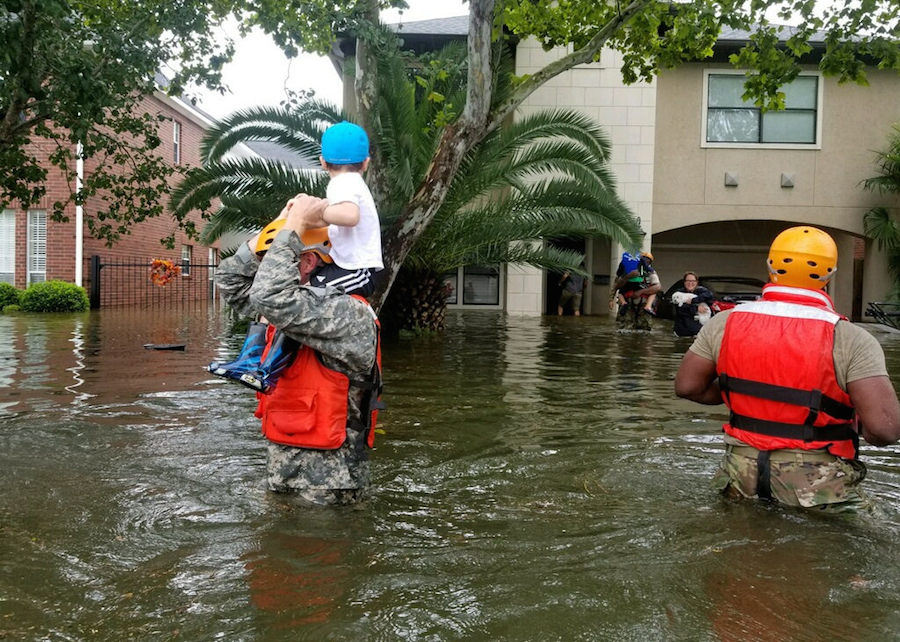Global Warming Linked to Devastation in Texas
Alex Kirby
Alex Kirby worked for BBC News as a foreign correspondent and then reported for 15 years on the environment. He was named Environment Journalist of the Year at...
By Alex Kirby / Climate News Network
Tropical storm Harvey is by any standard off the scale. Some parts of Texas have received in just over a week the rainfall they would normally expect in an entire year, and the storm is described as generating as much rain as would normally be seen only once in over 1,000 years.
Exceptional as it is, Harvey is not a direct consequence of climate change, in the judgement of one leading climate scientist, Stefan Rahmstorf, co-chair of Earth System Analysis at the Potsdam Institute for Climate Impact Research (PIK) in Germany.
However, Professor Rahmstorf couples his clear rebuttal that the warming climate triggered Harvey with a significant qualification. The increased heat accumulating in the atmosphere, he says, has almost certainly intensified the storm’s destructiveness, in line with other evidence suggesting a link between extreme weather and the human influence on the climate.
In a statement released by PIK, he says: “Storm Harvey was not caused by climate change, yet its impacts---the storm surge, and especially the extreme rainfall---very likely worsened due to human-caused global warming.
Extreme rainfall
“Asking for a single cause of a specific weather event usually doesn’t make sense, since there’s always a number of factors at play. What can be said is whether and how climate change affects the character of some extreme events. Scientific findings from past decades offer some insights here.
“A logical consequence of global warming is a global increase of extreme rainfall events---in the case of Harvey, it is in fact the heavy rain and the resulting flooding which is probably the greatest threat.
“The increase of extreme precipitation is due to the fact that warmer air can hold more water vapour.
“A global increase of daily rainfall records is indeed seen in the rainfall observations, as has been shown in a PIK study. This trend will continue as long as we keep pushing up global temperatures by emitting greenhouse gases.
“More tentative, yet quite possibly also relevant, is a general slowdown of atmospheric summer circulation in the mid-latitudes. This is a consequence of the disproportionally strong warming in the Arctic. It can make weather systems move less and stay longer in a given location---which can significantly enhance the impacts of rainfall extremes, just like we’re sadly witnessing in Houston.”
In what sounds like support for Professor Rahmstorf’s tentative suggestion, a BBC journalist reported on Tuesday: “The big problem with tropical storm Harvey is just how slow-moving it has become, with the centre of the storm just meandering around, allowing moisture to pile in continuously from the Gulf of Mexico, and that has fed torrential rain, which has affected the same areas for several days now.”
Rahmstorf says that no change in the overall frequency of tropical storms was expected, and no significant change had been observed so far. But theory and models both suggest there was likely to be a change in the intensity of storms.
“The strongest tropical storms could become even stronger due to increasing sea surface temperatures, because this is where these storms get their energy from,” he says. “That’s the reason they develop only above water warmed to at least 26°C [78.8 F].
Strongest storms
“It is under debate whether observational data support the theoretical expectation of an increase in the strongest storms, since these are rare and the observational data series therefore need to be very long and homogeneous to be conclusive.
“Rising seas are a clear result of global warming, causing ocean levels to increase by roughly 20cm [7.87 inches] since the late 19th century. Thermal expansion of sea water, melting mountain glaciers and mass loss in Greenland and Antarctica are the main contributors.”
Tim Palmer, Royal Society research professor in climate physics at the University of Oxford, UK, says that perhaps the single most important question for attributing Harvey to climate change is whether such stationary hurricanes would become more commonplace in the future.
“This is a question about possible changes in circulation, and hence dynamics,” he says. “There is still uncertainty about many aspects of the dynamics of climate change, and this will only be addressed by investment in climate models and the top-of-the-range supercomputers needed to run them.
“This is an area where UK scientists must continue to collaborate strongly with their colleagues in Europe.”
Dave Reay, professor of carbon management at the University of Edinburgh’s School of Geosciences, UK, says: “Flood defence plans based only on past events will become obsolete as our warming atmosphere delivers much more rain and much more often. President Trump may have withdrawn the US from the Paris Climate Agreement, but he can’t opt out of the laws of physics.”
Other countries are also struggling with severe flooding. Reports from Bangladesh, for instance, say that by late August more than 100,000 people in flood-affected areas had sought refuge in emergency centers.





